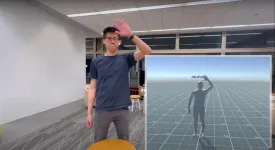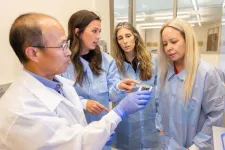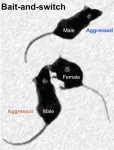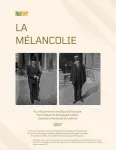(Press-News.org) Climate change presents far-reaching implications for the planet’s weather, sea levels, animals and food supply. Now experts are addressing climate change’s adverse effects on human health.
“We need to try to reduce risks for people, especially vulnerable populations,” said Ardythe Morrow, PhD, MSc, professor and director of the Epidemiology division of the Department of Environmental and Public Health Sciences at the University of Cincinnati College of Medicine.
To that end, the National Institute of Environmental Health Sciences of the National Institutes of Health has awarded a three-year, $4 million grant to UC to establish the Cincinnati Center for Climate and Health.
The center’s ambitious mission combines cutting-edge research, hands-on training and community engagement.
Morrow and George Leikauf, PhD, will serve as co-directors of this innovative new center. Leikauf is a professor in the Pulmonary, Critical Care and Sleep Medicine division of the Department of Internal Medicine at the College of Medicine.
The World Health Organization has declared climate change as the greatest threat to human health in the 21st century. This center will help position UC as a leader in advancing the understanding of climate change and addressing its health impacts, furthering scientific research, education, training and community involvement.
The center places UC among an elite group of 21 centers nationwide and one of only a few in the Midwest. It is set to make a major impact on how climate challenges are tackled in the region.
“We are going to make this center a hub for climate change health. We will be both a collaborative partner and a leader among the funded centers,” said Leikauf. "Implementing solutions to address climate change presents a huge opportunity to promote better health and protect people from climate-sensitive diseases."
The work of the center will focus on understanding and reducing the health impacts of climate change on vulnerable populations, including first responders, outdoor workers, pregnant women and children, and senior citizens living in economically disadvantaged urban areas.
“Our main goal with the center is protecting the health of the community,” said Morrow. “We can’t be complacent about climate change.”
Two of the center’s initial research projects will revolve around a primary theme of extreme heat exposure and the body’s immune responses.
One will involve 24 firefighters from suburban Cincinnati communities. Their health metrics will be tracked before, during, and after live burns, documenting the stress that the extreme heat of a fire puts on their bodies.
The other research project will involve 48 people who are elderly and living without air conditioning in three vulnerable Cincinnati neighborhoods. They will undergo biomonitoring before and during the warm summer months, particularly after heat waves.
The research projects will be led by Leikauf; Amit Bhattacharya, PhD, professor in the Department of Environmental and Public Health Sciences and founding director of the Early Detection of Degenerative Disorders and Innovative Solutions Lab; and Patrick Ryan, PhD, MS, professor in the Department of Pediatrics in the division of Biostatistics and Epidemiology, who works at Cincinnati Children’s Hospital Medical Center.
Additionally, the center will launch a new graduate certificate program in climate change and health.
The center’s training programs will empower the next generation of climate health researchers through awards for graduate students, competitive pilot grants for faculty members and expert mentorship.
They also plan to host public events, including a lecture series and monthly seminar, and disseminate a newsletter called Weathering Change, designed to engage the community.
The center will collaborate with community partners — including Groundwork Ohio River Valley and Green Umbrella’s Climate Research Incubator — that have a deep, ongoing commitment to climate action, in order to better understand how vulnerable communities in the region experience the health impacts of climate change.
An annual climate change and health conference is also planned, with the first one expected to be held in the summer of 2025.
The center embodies interdisciplinary collaboration with more than 40 UC faculty members involved. They represent the College of Medicine; College of Arts and Sciences; College of Nursing; College of Allied Health Sciences; College of Design, Architecture, Art and Planning; College of Education, Criminal Justice and Human Services; College of Engineering and Applied Science; Lindner College of Business; and Graduate College.
The center’s administrative core includes Morrow, Leikauf and Kermit Davis, PhD, professor and section chief in Environmental and Industrial Hygiene in the Department of Environmental and Public Health Sciences.
The center’s development core includes Kelly Brunst, PhD, associate professor in the Department of Environmental and Public Health Sciences; David Stradling, PhD, Zane L. Miller professor of urban history in the College of Arts and Sciences and interim head of the Department of History; and Angelico Mendy, MD, PhD, assistant professor in the Department of Environmental and Public Health Sciences.
The center’s community engagement core includes Michelle Burbage, PhD, associate professor-educator in the Department of Environmental and Public Health Sciences and director of the Master of Public Health program, and Shaunak Sastry, PhD, provostal fellow and professor of communication in the College of Arts and Sciences and a public health faculty member.
Faculty members of other universities in the region — Northern Kentucky University, Indiana University and Central State University — are also involved.
The new center is also partnering with Cincinnati Children’s Hospital, the National Institute for Occupational Safety and Health, and the International Chemical Workers’ Union to ensure a wide-ranging impact.
END
New climate change health research center under development at the University of Cincinnati
UC awarded $4 million grant for research, training, public engagement
2024-10-15
ELSE PRESS RELEASES FROM THIS DATE:
Educational psychologists can play a part in fighting TikTok mental health and neurodiversity misinformation
2024-10-15
Educational psychologists could help to fight mental health and neurodiversity misinformation on TikTok as more young people self-diagnose based on poor quality content on the platform, a new study says.
Growing numbers of young people may be labelling themselves as being neurodivergent or having mental health conditions after engaging with information online, some of which may be inaccurate.
Educational psychologists and their professional bodies could engage with TikTok by creating accessible evidence-based content about neurodiversity and mental health on the platform.
Their assessments could also ...
Winners announced in $300,000 pediatric medical device competition focused on pediatric cardiology
2024-10-15
WASHINGTON (Oct. 15, 2024)—Six medical technology innovators focused on pediatric cardiology were selected to receive grants of $50,000 each in the “Make Your Medical Device Pitch for Kids!TM” competition in Toronto. The funds will help awardees bring their devices to the market and improve care for children with heart conditions.
The awardees, selected from a highly competitive field of ten finalists, are:
Bloom Standard, Minneapolis—Autonomous, hands-free ultrasound
Compremium AG, Bern, Switzerland—Noninvasive central venous pressure estimation for pediatric patients
Massachusetts ...
New app performs real-time, full-body motion capture with a smartphone
2024-10-15
Northwestern University engineers have developed a new system for full-body motion capture — and it doesn’t require specialized rooms, expensive equipment, bulky cameras or an array of sensors.
Instead, it requires a simple mobile device.
Called MobilePoser, the new system leverages sensors already embedded within consumer mobile devices, including smartphones, smart watches and wireless earbuds. Using a combination of sensor data, machine learning and physics, MobilePoser accurately ...
Immune signatures may predict adverse events from immunotherapy
2024-10-15
Distinct immune “signatures” in patients who develop adverse events while taking immunotherapy for cancer may help oncologists identify patients at risk and treat them early to prevent serious side effects, suggests a study by researchers from the Johns Hopkins Kimmel Cancer Center and its Bloomberg~Kimmel Institute for Cancer Immunotherapy.
The study, published Oct. 15 in the Journal of Clinical Investigation, is the largest to date to look at immune signatures in patients with a range of cancers. It included a diverse sample of 111 patients treated with immune checkpoint inhibitors ...
UTA invests in cutting-edge genomic research technology
2024-10-15
The North Texas Genome Center (NTGC) at UT Arlington is getting an upgrade in the form of a next-generation genetic sequencer that will allow researchers to study genetic links between health and disease at a large scale. The new $1 million instrument, the only one of its kind in North Texas, will allow faculty and students to more deeply analyze rare genetic variants, an important step in discovering new insights for the future of health care.
“I’m excited to be able to expand and upgrade the technological capabilities of the North Texas Genome Center, a collaborative ...
Male mice use female mice to distract aggressors and avoid conflict
2024-10-15
A research group led by Joshua Neunuebel at the University of Delaware, USA, tracked the behavior of mice using machine learning to understand how they handle aggressive behavior from other mice. The researchers’ findings, published on October 15th in the open-access journal PLOS Biology, show that male mice deescalate aggressive encounters by running over to a female mouse to distract the aggressive male mouse.
The researchers recorded groups of two male and two female mice interacting over five hours. Like many other animals, mice have social hierarchies, and in almost each group recorded, one male was always significantly more aggressive towards the other.
Social interactions ...
19th century French psychiatrists: Unsung heroes of modern melancholia research
2024-10-15
In an era where mental health awareness is at the forefront of public discourse, a new historical review is shedding light on the often-overlooked French contributions to our understanding of depression. Published in Genomic Psychiatry, the study by Dr. Kenneth S. Kendler and Virginia Justis of Virginia Commonwealth University examines a seminal 1897 French monograph that helped shape modern concepts of melancholia and depression.
The review focuses on "La Mélancolie" by Jacques Roubinovitch ...
Fighting the opioid epidemic: AI and optimization model leads to more accessible, equitable treatment resource distribution
2024-10-15
New Study Key Takeaways:
New model focuses on more equity and accessibility in opioid overdose treatment locations and resource allocation.
Utilizing this model, the results project that within 2 years, there will be a decrease in the number of people with opioid use disorder, an increase in the number of people getting treatment and a decrease in opioid-related deaths.
Policymakers should target adding treatment facilities to counties that have significantly fewer facilities than their population share and are more socially vulnerable.
BALTIMORE, MD, October 15, 2024 – The opioid epidemic is a crisis that has plagued the United States for decades. ...
2 million voters with felony convictions have the right to vote – but might not know
2024-10-15
Key takeaways
Voting eligibility for people with felony convictions has expanded since 1997, with more than two million individuals now able to vote.
Several factors, like misinformation, distrust of government or lack of clarity around procedures, impede many from exercising their right to vote.
Direct outreach, including through trusted, on-the-ground community organizations, as well as informational text messaging, can help eligible voters navigate the process and make sure their voices are included in elections.
As get-out-the-vote efforts hit high gear nationwide, a team of sociologists, political scientists ...
Alzheimer’s disease may damage the brain in two phases
2024-10-15
Alzheimer’s disease may damage the brain in two distinct phases, based on new research funded by the National Institutes of Health (NIH) using sophisticated brain mapping tools. According to researchers who discovered this new view, the first, early phase happens slowly and silently — before people experience memory problems — harming just a few vulnerable cell types. In contrast, the second, late phase causes damage that is more widely destructive and coincides with the appearance of symptoms and the rapid ...
LAST 30 PRESS RELEASES:
Pollen exposure linked to poorer exam results taken at the end of secondary school
7 hours 18 mins may be optimal sleep length for avoiding type 2 diabetes precursor
Around 6 deaths a year linked to clubbing in the UK
Children’s development set back years by Covid lockdowns, study reveals
Four decades of data give unique insight into the Sun’s inner life
Urban trees can absorb more CO₂ than cars emit during summer
Fund for Science and Technology awards $15 million to Scripps Oceanography
New NIH grant advances Lupus protein research
New farm-scale biochar system could cut agricultural emissions by 75 percent while removing carbon from the atmosphere
From herbal waste to high performance clean water material: Turning traditional medicine residues into powerful biochar
New sulfur-iron biochar shows powerful ability to lock up arsenic and cadmium in contaminated soils
AI-driven chart review accurately identifies potential rare disease trial participants in new study
Paleontologist Stephen Chester and colleagues reveal new clues about early primate evolution
UF research finds a gentler way to treat aggressive gum disease
Strong alcohol policy could reduce cancer in Canada
Air pollution from wildfires linked to higher rate of stroke
Tiny flows, big insights: microfluidics system boosts super-resolution microscopy
Pennington Biomedical researcher publishes editorial in leading American Heart Association journal
New tool reveals the secrets of HIV-infected cells
HMH scientists calculate breathing-brain wave rhythms in deepest sleep
Electron microscopy shows ‘mouse bite’ defects in semiconductors
Ochsner Children's CEO joins Make-A-Wish Board
Research spotlight: Exploring the neural basis of visual imagination
Wildlife imaging shows that AI models aren’t as smart as we think
Prolonged drought linked to instability in key nitrogen-cycling microbes in Connecticut salt marsh
Self-cleaning fuel cells? Researchers reveal steam-powered fix for ‘sulfur poisoning’
Bacteria found in mouth and gut may help protect against severe peanut allergic reactions
Ultra-processed foods in preschool years associated with behavioural difficulties in childhood
A fanged frog long thought to be one species is revealing itself to be several
Weill Cornell Medicine selected for Prostate Cancer Foundation Challenge Award
[Press-News.org] New climate change health research center under development at the University of CincinnatiUC awarded $4 million grant for research, training, public engagement




